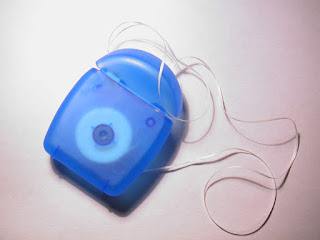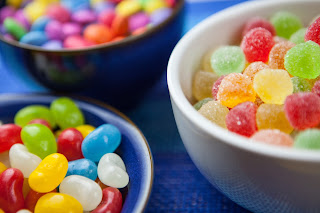Do I Really Need to Floss My Teeth?
Is it really necessary?
Flossing isn’t fun. It hurts your fingers, it's hard to get
it between your back teeth, teeth can be tight together, fillings can cut
floss, etc etc. I’ve heard it all. Besides the difficulties sometimes
associated with flossing, it takes time, it doesn’t make things feel any
cleaner, it can hurt, and the immediate benefit can be difficult to visualize.
So, what does it do? Flossing in simple terms disrupts
bacteria. It takes a colony of bacteria that’s forming in between your teeth
and dismantles it. It removes some plaque from in between your teeth, but
mostly it stirs up the bacteria that lives there and destroys their progress. After
a dental cleaning your mouth immediately begins the process of building back that plaque
and tartar that was just removed. Plaque forms on the surface of the tooth, saliva deposits minerals
onto the tooth and, if left long enough, that becomes tartar. Tartar or calculus is a combination of a
framework of calcium deposits and a colony of bacteria. While plaque can be
cleaned off with a toothbrush, tartar sticks to the teeth and isn’t readily
removed with brushing. Only during a cleaning do those chunks of tartar come
flying off.
Unfortunately brushing and flossing alone cannot keep your mouth clean forever. So, why do we brush and floss if the tartar is just going to keep building up? Brushing and flossing does eliminate some of the bacteria and we can keep the gums healthy for a period of time even with tartar present.
Unfortunately brushing and flossing alone cannot keep your mouth clean forever. So, why do we brush and floss if the tartar is just going to keep building up? Brushing and flossing does eliminate some of the bacteria and we can keep the gums healthy for a period of time even with tartar present.
One thing you can do to see the difference that flossing
makes is to go a few days without flossing. Then when you floss, smell the
floss. It will smell pretty pungent. Now try flossing daily and smell the floss. You
won’t smell much at all.
So, if you want to avoid bleeding gums, gum disease,
cavities, and bad breath, use that floss!
When patients come into my office I can usually tell if they
have been flossing. No, I don’t have a magic ball that tells me whether you
floss or not! A person that flosses has gums that are a nice light pink color
and they don’t bleed easily. Someone that doesn’t floss usually has a more red
color and they can be inflamed around the teeth or when I touch them
they bleed easily. There are some patients that have healthy gums even when
they don’t floss and some people that still tend to get some inflammation when
they do floss, but they are few and far between.
The truth of the matter is you should be honest with your dentist about your hygiene habits. It doesn’t help anyone if you stretch the truth on how often you brush or floss. For your dentist to evaluate the state of health in your mouth he needs to know what is actually going on at home to keep them clean. I try to never pass judgment on whether someone flosses or not. In the end, it’s your teeth and your decision.
The truth of the matter is you should be honest with your dentist about your hygiene habits. It doesn’t help anyone if you stretch the truth on how often you brush or floss. For your dentist to evaluate the state of health in your mouth he needs to know what is actually going on at home to keep them clean. I try to never pass judgment on whether someone flosses or not. In the end, it’s your teeth and your decision.
This is a good question. And it's one I will answer without
any scientific evidence, but based on my own observations. I will preface
this by saying that my hygienist does not agree with me. So, take it as you
will.
My feelings are that any floss is good. If you prefer to use
picks or forks than to put your fingers in your mouth than great. I can’t look
in your mouth and tell you if you use normal floss or picks, but I can tell if
you’re not using anything. From my perspective this is evidence that both
methods are working. From the perspective of my hygienist, we are taught and
teach our patients that they should be using a clean section of floss every
time they put it in-between their teeth, shifting down the floss one inch each
time. Then they are to use a “J” motion to clean on the sides of each tooth.
The picks reuse the same piece of floss each time it’s inserted. It is also
much harder to do a “J” motion with the picks. Because of this some
professionals, including my hygienists, don’t like the picks.
Technically, yes, normal floss is better if used correctly,
but in theory both can be good resources to clean in between your teeth. Since
we are just trying to disrupt bacterial formation I think that both do a
proficient job of this.
In summary, don’t stop using normal floss if you already
have this habit down, but if you’re looking for a way to start flossing, then
the picks may be a good way for you to start this habit. I’ll count it either
way!
 Why did I hear that flossing is no longer recommended by the U.S.
Department of Health and Human Services?
Why did I hear that flossing is no longer recommended by the U.S.
Department of Health and Human Services?
The myth that flossing is no longer needed or recommended came from an article from the Associated Press in August 2016. (To read this article click here.) Everyone jumped on board with this opinion, including the New York Times in their article found here. Despite popular opinion, flossing is important!
The articles were derived from fact that flossing was omitted from the Dietary Guidelines published by the US Department of Agriculture and US Department of Health and Human Services. The government is required to have all of their facts backed by scientific evidence. Since 1979 they have recommended flossing as part of a daily regimen. When they were pressed to demonstrate the scientific evidence that supports flossing, their research was lacking. Because of this, they legally had to remove it from their recommendations.
It comes down to this: every dentist in America can see the benefit of flossing. We see that benefit on a daily basis. We have the day-to-day proof of what flossing does for our mouth. There has never been a need for millions of dollars worth of research to prove what we already know. The ADA and other dental associations still back flossing 100%. Don’t let this media flurry of a government technicality stop you from any flossing you are doing. It’s still recommended. To read the ADA response to these articles, click here. To see the ADA recommendations for flossing, click here.
The articles were derived from fact that flossing was omitted from the Dietary Guidelines published by the US Department of Agriculture and US Department of Health and Human Services. The government is required to have all of their facts backed by scientific evidence. Since 1979 they have recommended flossing as part of a daily regimen. When they were pressed to demonstrate the scientific evidence that supports flossing, their research was lacking. Because of this, they legally had to remove it from their recommendations.
It comes down to this: every dentist in America can see the benefit of flossing. We see that benefit on a daily basis. We have the day-to-day proof of what flossing does for our mouth. There has never been a need for millions of dollars worth of research to prove what we already know. The ADA and other dental associations still back flossing 100%. Don’t let this media flurry of a government technicality stop you from any flossing you are doing. It’s still recommended. To read the ADA response to these articles, click here. To see the ADA recommendations for flossing, click here.
Happy flossing!
~ Cyrus M. Larson, DMD






Comments
Post a Comment